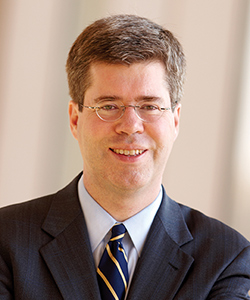 June 11, 2015 – Marquette University Law School Dean Joseph Kearney today announced his personal support for a proposal to change the term of office for Wisconsin Supreme Court justices to a single, 16-year term, a plan developed and approved by the State Bar of Wisconsin.
June 11, 2015 – Marquette University Law School Dean Joseph Kearney today announced his personal support for a proposal to change the term of office for Wisconsin Supreme Court justices to a single, 16-year term, a plan developed and approved by the State Bar of Wisconsin.
Speaking at the Western District of Wisconsin Bar Association’s Annual Meeting in Madison, Dean Kearney said the state supreme court “needs our help.”
Enacting a 16-year term limit – which would eliminate re-election campaigns and the negative perceptions and feelings those campaigns can engender – could help re-establish collegiality on the court as well as public confidence in the court system.
“It is not to go out on a limb to say that the court needs help,” said Kearney, with Wisconsin Supreme Court Chief Justice Patience Roggensack in attendance. “No one can reasonably maintain that today’s court enjoys the basic collegiality that is an important enabling component of a law-declaring appellate court.”
Dean Kearney said the bar and the people of Wisconsin can help the court by passing a proposal he called “elegant, even brilliant, in its simplicity.” The proposal, developed by a State Bar Task Force and approved by the State Bar’s Board of Governors, would amend Article VII of the Wisconsin Constitution to create a nonrenewable, 16-year term.

“Most fundamentally, the proposal ensures that justices will not become political candidates for re-election.” – Marquette Law School Dean Joseph Kearney
“Most fundamentally, the proposal ensures that justices will not become political candidates for re-election,” Dean Kearney noted. “Once elected, justices will be free to focus fully on the law and the court’s vital role under the Wisconsin Constitution.
“They will not need to seek support for re-election from individuals and groups with identifiable political perspectives and economic interests. As one task force member has stated, ‘you can just spend your time being a judge.’ Imagine that, I would append to that statement.”
Dean Kearney Calls Proposal a "Good Idea" for Wisconsin
Creating a single, 16-year term would reduce the negative advertising that demeans incumbent justices and the office of supreme court justice in general, he says.
“The reason for the decrease under the proposal is elementary,” Kearney explained. “Elections will involve candidates, none of whom has ever served on the court or, at most, a candidate who has served only a short time following an appointment to fill a vacancy. Either way, the campaigns are much less likely to generate negative attack ads that distort a justice’s record on the court.”
It makes sense to have a term limit, Kearney says, because incumbents are almost always re-elected anyway. In almost 100 years, only one incumbent justice has lost. Why have nasty re-election campaigns when the incumbent will likely win anyway?
“So our present system gives us expensive, degrading, polarizing re-election races, which may distort decisions and almost always end with the re-election of the incumbent justice. How much better, it seems, to extend the term of the incumbent but avoid the distorting and ugly re-election process,” Dean Kearney said.
Dean Kearney also said the proposal will likely increase collegiality by eliminating the possibility that justices will publicly or privately oppose a colleague’s reelection.
“Let no one doubt that this has been the source of much of the court’s well-publicized problems in recent years,” said Kearney, who reiterated that he was not speaking for Marquette Law School but in his personal capacity as a lawyer in Wisconsin.
Like any policy change, the proposal will have detractors, said Dean Kearney, who normally does not comment publicly on Wisconsin policy but thought this issue was of significant importance to warrant his personal recommendation in a public forum.
Whatever criticisms the proposal draws, he says the proposal maintains Wisconsin’s tradition of electing justices and is “politically neutral.” Fundamentally, the proposal "is a good idea," he said.
“It maintains Wisconsin’s tradition of nonpartisan election of supreme court justices but reduces the frequency of often politically charged and costly elections,” he said.
“Both those outside the court, and those within, will have considerably less reason to act in ways that reduce confidence in the highest judicial tribunal of this great state.”
Because the proposal calls for a constitutional amendment, it requires passage by two consecutive legislatures and must be approved by voters through a referendum. The State Bar is currently working toward introduction of a legislative bill on this issue.
In a post-talk interview, Dean Kearney said the court has been facing challenges “for some time now” and there’s a danger in doing nothing.
“The primary danger is that we will continue to be beset by re-election races that focus in unhelpful and inappropriate ways on votes that justices have taken on the court in contested cases, and we will have the sorts of campaigns that really bring unhappiness to the public perception of the legal profession.”
